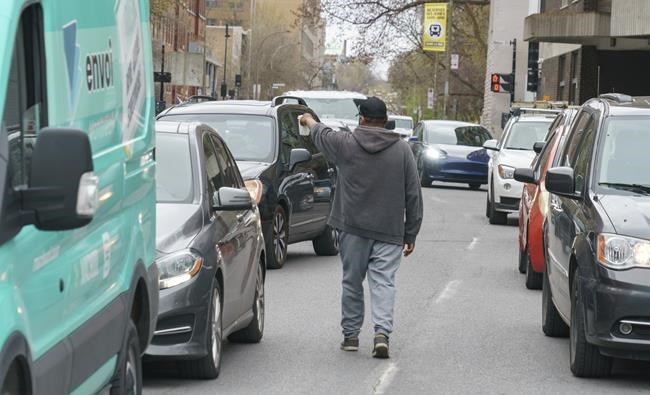TORONTO — An Ontario judge has struck down sections of the province's panhandling law as unconstitutional, including parts that ban asking people for money while intoxicated or while they are waiting to use an ATM.
The case was launched in 2017 by the Fair Change legal clinic against the Safe Streets Act, the second constitutional challenge against the law that has been in force since 2000.
Ontario’s Progressive Conservative government at the time passed the law, a few years after it cut welfare benefits by 21.6 per cent.
The law prohibits soliciting in an aggressive manner, specifying six ways panhandling is defined as aggressive, and it bans soliciting a "captive audience," setting out six locations that meet that definition.
Fair Change argued the law violates several Charter rights, including freedom of expression and the right not to be subjected to cruel and unusual punishment.
Superior Court Judge Robert Centa did not accept all of the Fair Change arguments, but ruled that most of the ways the law defines aggressive solicitation violate the presumption of innocence, and prohibiting panhandling in certain locations violates freedom of expression rights.
It is not necessarily true that someone who asks for money while intoxicated by drugs is panhandling in a way that could likely cause concern for another person's safety, Centa wrote in the decision.
"I do not accept that a reasonable person would fear for their safety and security if they walked past a person who was sitting cross-legged on the ground, intoxicated by marijuana, smiling blissfully, and holding a sign that said, 'Please spare some change so that my baby and I can get something to eat,'" he wrote.
The other impugned "aggressive" solicitation sections include obstructing someone's path, using abusive language, and walking behind or beside someone while asking them for money.
The court left intact the broader section against soliciting in an aggressive manner – after striking downs some of the definitions of what counts as aggressive – and threatening people with physical harm while soliciting.
Centa also upheld a ban on walking onto a street to ask drivers for money, but struck down the other ways the law defined soliciting a "captive audience," including where people are waiting to use an ATM.
"The mere presence of a homeless person soliciting gifts from persons doing certain things at a prohibited site does not, on its own and without more, pose any danger or impediment to the safe use of public space," Centa wrote.
"Soliciting is of fundamental importance to persons in need and has a real social value. Even if the presence of persons soliciting is annoying or even offensive, a blanket ban on all solicitations is not a proportional limit on freedom of expression."
The other "captive audience" provisions that were struck down include someone waiting to use a pay telephone, someone waiting for a taxi or public transit, and someone who is on public transit.
The Canadian Civil Liberties Association said it is a significant victory in the fight against the law's limits on the ability of poor people to ask their fellow citizens for help.
"This decision affirms that the Safe Streets Act is an unconstitutional restriction of the freedom of unhoused and low-income people who seek donations from the public in order to survive and live with dignity,” Harini Sivalingam, the CCLA's director of the equality program, wrote in a statement.
Violations of the law come with a maximum fine of $500 for the first offence and a maximum fine of $1,000 or imprisonment for up to six months for subsequent offences.
Fair Change's arguments cited a 2011 research paper that found the Toronto Police Service issued 67,388 tickets under the Safe Streets Act from 2000 to 2010, totalling more than $4 million. Only $8,086.56 was collected, Fair Change said.
This report by The Canadian Press was first published April 3, 2024.
Allison Jones, The Canadian Press
Note to readers: This story has been updated to correct the description in the accompanying photo caption.
